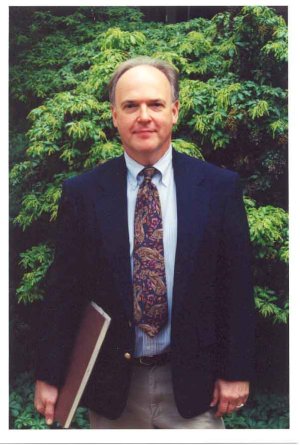by Richard Coffey, The Choral Journal
Return to Gwyneth Walker Home Page
Return to Gwyneth Walker Music Catalog
Return to Gwyneth Walker Recordings Page
Read notes for An Hour to Dance (1998) for SATB chorus and piano
(Photograph of conductor Richard Coffey of CONCORA [Connecticut Choral Artists].)

Gwyneth Walker is a master composer with a fertile imagination and a knack for finding texts of such unusual imagery and beauty that one feels she will never run out of words to set (and we hope not!). Walker always lets the poet speak first, and the music takes its shape thereafter. With never a wasted gesture, yet often with crucial and overwhelming repetitions, she grasps the mind of the poet, overlays it with inspired music, and sends it out to the rest of us.
This twenty-one minute cycle of seven poems by Virginia Hamilton Adair presents "an overview of the life and work of the poet," according to the composer, who further adds, "from the opening 'Key Ring,' filled with the anticipation of life's mysteries yet to be explored, to the closing 'Take My Hand,' expressing resignation of a life gone by, the poems grow in vitality, color and romance, and then fade into stillness, loss of color and a vanishing of sight."
A few quotations from the poetry are necessary to show the remarkable inspiration: "When my grandfather was very old / to one small room confined / he gave me his big bunch of keys to hold..." To this Walker adds the sounds of keys jingling (at the piano), and the choir issues a recitation on pitch to launch the series. "My mother wept in church, Episcopalian; / Over her far-off town the sun shone bright. / Her New York City child, I felt an alien, / Coming to a crossing the train cried in the night." Now the singers utter the sounds of a train, spoken off pitch (and not a gimmick at all!) The polyphony that follows lets us hear and revel in the motion of the train, in countless repetition of "coming to a crossing."
With brief exceptions in numbers 3, 4, and 6, there are no divisi. A mezzo-soprano solo, recitative-like, appears in number 7 ("My mother wept in church," noted above). The piano accompaniment is full partner in the cycle, not overwhelming, but requiring a skilled, flexible performer. The vocal demands are reasonable in every way. Whether in cycle or separate, these works will enhance any concert program and give high tribute to outstanding American poetry and music combined.
From The Choral Journal, December 2000
Reviewer Coffey adds further: "If you're a conductor, you should have a study copy of everything that Gwyneth Walker has written."